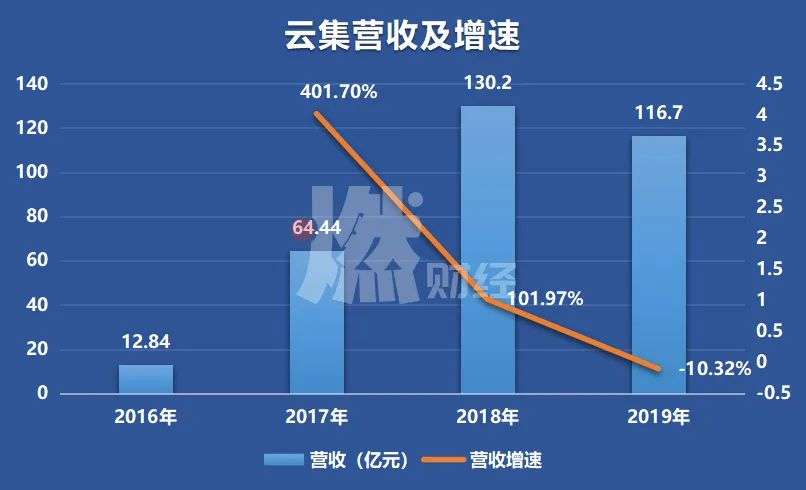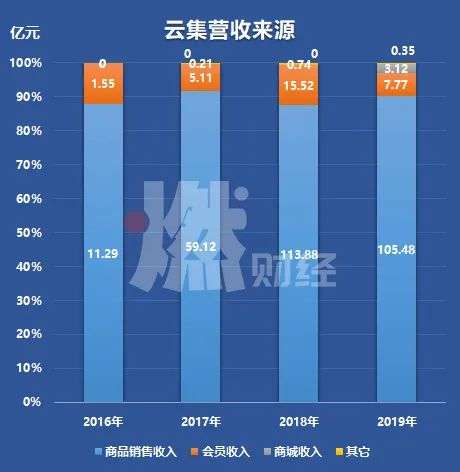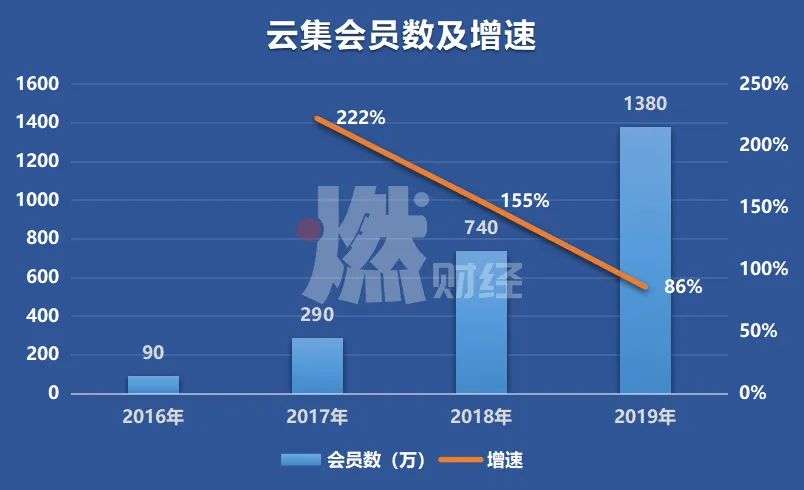The dark horse of e-commerce fell into the altar, and the story of the Chinese version of COSTCO is not easy to tell.
Editor’s note: This article comes from the WeChat public account “burn finance” (ID: rancaijing).
Author | Tang Yahua
Edit | Dawn
This is a “changing” company.
Successful development, punishment for suspected MLM, and successful listing after the transformation of member e-commerce. After the listing, the stock price changed, and the market value evaporated by 70% a year. The development of these years has always been unexpected.
On June 3, Yunji released the first quarter of 2020 financial report, with a total revenue of 1.649 billion yuan, a year-on-year decrease of about 51%, and a net loss of 13.2 million yuan. The net profit for the same period last year was 16.9 million yuan. .
Despite the special situation like the epidemic in the first quarter, Yunji’s performance last year was also not optimistic. In 2019, Yunji’s revenue declined for the first time, with a loss of 126 million yuan, which was larger than the loss of 60 million yuan in 2018. Since its establishment, Yunji has accumulated losses of more than 300 million yuan.
The capital market gave the most intuitive feedback. As of June 4, Yunji’s stock price was $3.61, a 67% drop from the issue price of $11 at the time of listing, and the market value was only $766 million.
From Taobao’s earliest owner of the Golden Crown to the four-year listing of the traders, the founder Xiao Shangluo was once a model of inspirational entrepreneurship. However, the business model of “pulling heads” and “making profits at every level” has caused this company to question MLM in the past. The Hangzhou Municipal Bureau of Supervision once regarded it as “suspected MLM” and fined it 9.58 million yuan.
Once again in the public’s field of vision, Yunji is already the “first member e-commerce stock”. It turned around gorgeously and sounded the bell of Nasdaq. Many people realized this, Yunji has successfully cleared the MLM suspect through the “member e-commerce” and went ashore.
The reversal is also very fast. In just one year of listing, Yunji is faced with the dilemma of revenue decline, loss expansion, member growth slowdown, and stock price plunge. What is curious is that the first share of member e-commerce What happened?
01 Become a rich hero, fall to the altar
One year after the listing, Yunji turned in a less-than-expected answer sheet.
First look at the latest financial data. In Q1 2020, Yunji’s total revenue was 1.649 billion yuan, a year-on-year decrease of about 51%, and a net loss of 13.2 million yuan, compared with a net profit of 16.9 million yuan in the same period last year. However, according to the non-GAAP statistical caliber, Yunji’s adjusted net profit was 26.1 million yuan.
Yunji Chairman and CEO Xiao Shangluo explained: “The main reason for the lower-than-expected growth is that the outbreak of the new crown epidemic hasOur operation plan caused interference, and our suppliers, business partners and logistics service partners were greatly challenged. “
In fact, apart from Q1, the business conditions gathered in 2019 are also unsatisfactory. The financial report shows that in 2019, Yunji’s revenue was 11.67 billion yuan, a decrease of 30.32%, but the net loss reached 126 million yuan, double the 2018 loss of nearly 60 million. According to non-general accounting standards, Yunji’s adjusted net profit in 2019 was 4.4 million yuan.
Although the number of company members increased from 7.4 million in 2018 to 13.8 million in 2019, the growth rate of members fell from 155% to 86%. Yunji explained that this was due to the weak performance of its core business “membership” and its own strategic adjustments.
It is curious that Yunji, as a dark horse killed by social e-commerce, went public with a halo of “member e-commerce first” only a year ago. Abandoned children”.
Source / Visual China
Everything starts with the gathering pattern.
In 1999, 21-year-old Xiao Shangluo came to Hangzhou from Anhui. Only a high school diploma, he helped his boss manage the auto supplies business. He did not know that at that time, in this groundbreaking year of the e-commerce industry, China’s first C2C e-commerce platform 8488 was launched, eBay was also established in Shanghai, and Ma Yun also founded Alibaba at this time.
Four years later, Xiao Shangluo’s car perfume business started online, and the store name is “Xiao Ye perfume”, which is mainly engaged in perfumes and cosmetics. At that time, Taobao was still robbing me with eBay. He first opened a store on eBay, and then moved to Taobao.
In August 2010, “Xiao Ye Perfume” became Taobao’s first three-golden crown store with online sales of 150 million yuan. An inspirational story of youth enrichment in a small town was born. Xiao Shangluo got the first pot of gold in the wave of e-commerce.
The crisis is approaching. After 2010, Ali exerted its strength in the B2C field, and many major offline brands and manufacturers were supported to open stores directly on the e-commerce platform. Taobao stores similar to the “two-way sellers” gradually lost their advantages, and the sales of “Xiaoya perfume” increased Slowly, profits are shrinking. Coupled with the subsequent double 11 price war, the industry ceiling has caused Taobao’s bargaining power to decline.
At least the shop makes money,But Xiao Shangluo, who was unwilling to become rich and safe, set off again. He is the beneficiary of Ma Yun’s concept of “let the world have no difficult business” and has become a practitioner. He began to think about whether there is any other way out for e-commerce and how to put his own resource advantages on everyone.
In 2015, Xiao Shangluo set up Yunji. The main gameplay was the S2B2C model. The upstream integrated suppliers, with the help of the WeChat social system, gathered Weishang traffic to sell goods. Yunji mainly earned commodity sales commission and membership fees. Also in this year, the seeds of change in the e-commerce industry were planted because Pinduoduo was also established. No one thought that the e-commerce industry with a piece of iron was torn open.
“We have collected the demands more efficiently through social means, which will bring about changes in vertical industries. These demands cannot be met in the previous industrialization era. At that time, I had what you bought. But today is actual On the other hand, the upstream supply side can be forced to solve the unmet demand.” Xiao Shangluo described what he did.
A new model was created when the e-commerce industry was stable and failed to match the supply chain. Pinduoduo and Yunji cut into social e-commerce from different angles, and they all circled out in a controversial posture to share food from giants.
Due to the fission of Weishangjia Community, two years after its establishment, Yunji’s transaction volume increased fourfold and exceeded 10 billion yuan. Meng Qi, the person in charge of Jingdong New Channel mentioned that the founder of Yunji has the background of daily chemical micro-commerce and the supply chain resources that have accumulated for many years. Yunji has a relatively mature distribution system with a large base, mature commission distribution mechanism and training system, plus Around 2016, the low-end e-commerce group has not been fully digested, so it has grown rapidly.
But at the same time, the company is also caught in the whirlpool of “suspicious MLM” public opinion. “The biggest challenge gathered is the misunderstanding of the outside world.” Xiao Shangluo said so.
02 Wash white and go ashore, the growth rate slows down
Although Yunji is known as a membership system, it is not a member model such as Taobao “88VIP”, Jingdong “PLUS member”, Suning “SUPER member”. In addition to shopping discounts, Yunji’s member rights are more important than inviting new members Get a commission.
For example, after a user pays a membership fee of 398 yuan to become a gathered member, he first has the eligibility to open a store and can “save money for own use and share money”. Inviting new members to join can get a membership fee commission and 15% of new members sales commission.
For example, A is a diamond member of the gathering platform. A invites B to pay 398 yuan to become a diamond member of the platform. A can get 150 yuan from the B membership fee plus 15% commission on the goods sold on the platform. B then invites C to become a diamond member. Members can get 150 yuan from the C membership fee plus 15% commission on the products sold by C on the platform, while A can also indirectly get 80 yuan from the C membership fee invited by B.
This mode of pulling people’s heads and benefiting them layer by layer will make Yunji taste sweet and eatSuffering. In 2017, Yunji was identified as “Suspected MLM” by the Hangzhou Municipal Bureau of Supervision and was fined 9.58 million yuan. The gathering of traffic in the form of tightrope walking also bears the consequences of this.
However, profit-driven Yunji’s revenue growth rate in 2017 reached 401.7%, and the number of members increased from more than 900,000 in 2016 to 2.9 million in 2017, a growth rate of 222%.
Drawing / Fuel Finance
In order to get rid of the labels of micro-commerce and MLM, Yunji announced its strategic transformation from social e-commerce to membership e-commerce in 2018.
However, this transformation is not a fundamental change. The Yunji platform has cut off the hierarchical relationship between members of more than two levels, changed the name of the store owner into a member, and lowered the threshold for member access. If the user can become a VIP member after registration, after paying the membership fee to upgrade to a diamond member, but diamond members can still rebate shopping, invite new users to get commissions.
Ango investor and Internet expert Guo Tao once mentioned in the report that membership-based e-commerce is not the development direction of social-based e-commerce, but is one of the means to get rid of supervision of some social e-commerce platforms that use distribution models.
Although the growth rate of Yunji’s revenue slowed down in 2018, it also exceeded 100%, but the loss has narrowed to more than 60 million. With good momentum, Yunji boarded US stocks in May 2019 and became the “first member of the Chinese member e-commerce”, enjoying a short highlight moment.
Drawing / Fuel Finance
At that time, the issue price of Yunji was US$11 per share, and the stock price on the first day of listing rose 28.64% to close at US$14.15 per share, with a market value of US$3.087 billion.
In order to diversify revenue, Yunji also increased the number of third-party merchants in 2019, the annual GMV increased to 35.2 billion, but the mall contributed only 350 revenue0 million yuan.
At this point, Yunji’s revenue comes from four parts: merchandise sales revenue, membership business revenue, mall business revenue and other revenue. Specifically, the cost of a user paying 399 yuan or purchasing the corresponding gift package is the member’s business income. After registering as a member, they start selling goods. The commission received by the platform is the sales income of goods, and the mall income is from third-party merchants After entering the platform, Yunji collects commissions obtained from sales.
As can be seen from the Yunji financial report, the largest contribution to revenue is the sales of goods, accounting for more than 85%, the membership revenue is about 10%, and the new mall revenue is very low. This shows that Yunji’s main business is actually self-operated e-commerce.
Drawing / Fuel Finance
In the whole of 2019, Yunji’s revenue did not increase but fell, and the company’s revenue fell by 10%, but the loss increased significantly to 110%. In Q1 2020, revenue and net profit continued to decline.
To a certain extent, it also shows that the member e-commerce that Yunji has transformed in order to get rid of the suspect of MLM is not effective.
03 Giant Besieged City, the story of the Chinese version of COSTCO is not easy to tell
Yunji has always been known as the Chinese version of COSTCO, but now, the story is getting more and more difficult.
Let’s first look at COSTCO, which is a model of membership-based e-commerce, which attracted madness by Huang Zheng and Lei Jun. The core of COSTCO lies in the extremely cost-effective pricing and the “less is beautiful” product selection strategy, which allows members to obtain low-cost and high-quality products while reducing the cost of selection. At the same time, COSTCO has obtained a strong bargaining power with its huge number of users, forcing the supply chain and manufacturers to produce special supplies for it. Because of the amazing order volume, manufacturers also have profits to make.
Although it is a supermarket, COSTCO does not make money by selling things, but feeds itself by membership fees. The financial report shows that in FY 2019, COSTCO’s net profit was 3.66 billion US dollars, and membership fee income was as high as 3.35 billion US dollars.
There is a point of view that Yunji is becoming an inexhaustible “four different things”. Today’s gathering includes the S2B2C model, membership model, social e-commerce, direct sales model, and platform model, but none of them can truly build a core competitiveness of barriers.
For example, gathered togetherThe point emphasizes the membership system, positioning member e-commerce, but the company’s membership growth rate has been declining. The growth rate in 2017 and 2018 can still be maintained at 222% and 155%. To 86%.
cartography / fuel finance
The income contributed by Yunji members is even more difficult to compare with COSTCO. In 2018, the revenue from members is still 1.552 billion. By 2019, its membership business revenue is only 777 million yuan, a year-on-year decrease of 49.94%, and the proportion of total revenue is only 6.7%. By Q1 of 2020, the income of Yunji members has decreased by 84% year-on-year to 25.1 million yuan.
The company said that the reason for the decrease in member income is that starting from January 2020, you only need to register an account on Yunji to enjoy one year of membership benefits for free. In other words, the gathered member services are free, so the revenue from members may be lower. However, lowering the membership threshold did not bring about corresponding revenue growth, and Q1’s revenue and net profit still declined.
“Yunji is the earliest S2B2C model in China and the model favored by Professor Zeng Ming. Its biggest advantage is to empower individuals and small and medium-sized teams to start businesses. The main disadvantage is that the business model is easy to be imitated. There are a lot of core competitive advantages that are really hard to be imitated are not obvious.” said Cui Lili, an e-commerce researcher at Shanghai University of Finance and Economics.
In addition, Meng Qi pointed out, “The gathered members have the status of both buyers and sellers, which is not the same as the traditional wholesale and retail sales. The main purpose is to avoid the risk of MLM and change the soup without changing the medicine. After the development of the platform, the supply chain is also directly connected to the manufacturers, eliminating the need for multi-level distribution, and the sales of Yunji are greatly affected.”
If the member-based e-commerce gathered is a social e-commerce model of new bottles and old wine, why did the early development of Yunji develop rapidly and the performance after the listing was dismal?
In fact, Yunji only makes up for the shortage of low-end and low-end consumer groups covered by e-commerce platforms, as well as the sales needs of small and medium-sized production enterprises. During the vacuum period for individuals to participate in business activities, Yunji seized the social dividend and the micro-business dividend, briefly won a time difference, and ordered the ants to make a quick move.
As the crowding mode of Pinduoduo is out of the circle, the crowds with precise social traffic and social traffic are cutting in, and the solidified e-commerce industry is beginning to loosen. now,




